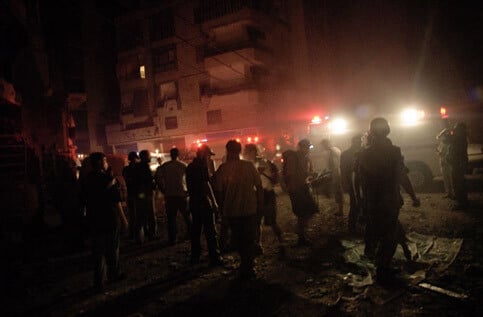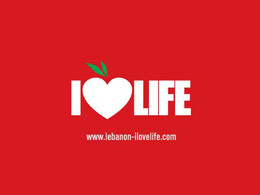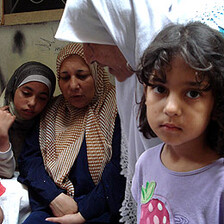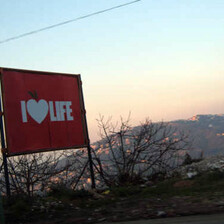Beirut 8 January 2007

Beirut, August 2005 (CJ Clarke)
We love life whenever we can.
We dance and throw up a minaret or raise palm trees for the violets growing between two martyrs.
We love life whenever we can.
We steal a thread from a silk-worm to weave a sky and a fence for our journey.
We open the garden gate for the jasmine to walk into the street as a beautiful day.
We love life whenever we can.
Wherever we settle we grow fast-growing plants, wherever we settle we harvest a murdered man.
We blow into the flute the color of far away, of far away, we draw on the dust in the passage the neighing of a horse.
And we write our names in the form of stones. Lightning brighten the night for us, brighten the night a little.
We love life whenever we can.
Unconsciously, I started to recite this poem, written by Mahmoud Darwish in the eighties, as I first came across the “I love life” and “J’aime la vie” slogans written in red and white letters and carried on billboards around Lebanon. Even before I knew the story of the slogans, the poem came to mind, because the slogans felt cut: We love life whenever we can! But there is so much anger from occupation, imperialism, and injustice around us. The omitted part from the slogan gives a fantasy of a choice of being able to live a life we want in the current state of the world.

The image of the “I Love Life” campaign.
“Culture of life” against the “culture of death” is another manifestation of the binary thinking through which the imperial war of the Bush administration is being waged. Either you are with us or against us, and if you are against us, an Iraq is your only option. We who represent the culture of life - after we are rid of any sort of resistance - against them - any group trying to resist us - who spread a culture of death. However, the “we” in the Bush administration discourse is inclusive not only of Americans but also of moderate Arab leaders and the new Arab business class, whose interests put them in the same camp with those who love life in the US against their fellow backward traditional citizens who embrace death.
The “I love life” campaign is still in its inception stage. However, it is intended to develop into a grassroots movement - funded by USAID! - aiming at taking actions to fight the culture of death and defeat those “who want us to live in the past!” The campaign started a month ago, when the opposition took to the streets to topple down the pro-US government. But the roots of the campaign go back to this past summer. Under Israeli aerial, marine and land-based shelling, “We want to live” and “Enough wars” were outcries that pro-government and pro-US Lebanese were sending not just against Israel and the US, but also against the Resistance that “ruined their summer, and destroyed Lebanon”. Again, insinuated in these outcries is an illusion of choice, a choice of a life we can live if only we want to. Insinuated in these outcries is a fantasy of an option of a life with Israel, a colonial state with expansionist dreams and an army equipped with the most advanced weapons in the world, right on our borders.
How the campaign will develop, and what life - or whose life - we will be taught to love and embrace is still not clear in Lebanon. However, a look at a similar campaign in Jordan, the “culture of hope” campaign, can shed light on the kind of life these Lebanese campaigners are promising us.
In an attempt to bridge the “Hope Gap” between the West and East, Queen Rania has called for World Economic Forum leaders to work on building a new “culture of hope” in the Middle East. The hope gap is being bridged in Jordan by USAID funds too. Save the Children USA-Jordan, has launched four USAID funded programs which director MacCormack says “are designed to help create the ‘Culture of Hope’ that King Abdullah and Queen Rania are working so hard to realize.”
Najah, Injaz, and School to Career are three of these Save the Children/USAID funded programs, and are designed to help Jordanian youth “become positive, active participants in a civil society and the economy through enhancing their knowledge and skills about the world of work.” This is done through teaching them employability skills in order to prepare them for work in the private sector, and bridge the gap between educational outcomes and market needs. Employability skills, dubbed also soft skills, include “accepting the other”, writing CVs, communication skills, and the culture of Entrepreneurship and “flexibility.” Youth are taught that success is not related to social position, and that work should be respected for its own sake. In other words, the program aims to spread a culture of responsibilization among youth. The market is open, and it is there for everybody, and it is up to you to take the responsibility for yourself. If you can’t make it in the market, it means you lack the skills of employability and you should work on yourself in order to make it in the system. This is the “culture of hope.” This is also quite likely the “culture of life.”
As the 9/11 events were solely caused by the culture of terrorism inherent in Islam, as the Bush administration convinced Americans, the “culture of desperation” and “culture of death” spread among youth in the region has nothing to do with the injustice of the global economy and the relentless greed of the private sector, those who love to live tell us. In other words, the role of these programs that are promoting positive thinking among youth, and spreading a culture of life, is to turn the insecurities of the neoliberal system to the individual himself or herself to be pacified and controlled.
“The US has not done anything abroad without trying it on the Americans themselves first,” I thought of my mentor’s words when thinking of “I love life” and “Bridging the gap of hope”. After all, is not the slogan “don’t worry, be happy”, that the corporations spread in the US, another face of our life and hope slogans? “Do not worry” is another way to tell people not to think of the injustices around, because there is someone thinking for them, as now there is someone who will live for us too! And all are an attempt to depoliticize the masses and indulge them in struggle within themselves.
Tomorrow we will love life,
When tomorrow comes, life will be something to adore,
just as it is, ordinary or tricky
gray or colorful, stripped of judgment day and purgatory
Says also Mahmoud Darwish, in his “State of Siege,” the poem he wrote under siege in Ramallah in 2000 debunking the illusion of a life under occupation and siege.
When tomorrow comes, the tomorrow of freedom from occupation, colonialism, injustice and humiliation, we will love our life - that we will create for ourselves - because unlike what the new elites with USAID money are trying to tell us, we have no choice at the moment. Tomorrow we will love life, because “we love life whenever we can afford it.”
Mayssoun Sukarieh, a native of Beirut, is a frequent contributor to Electronic Lebanon.
Related Links




